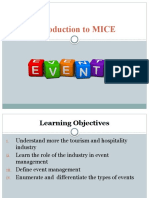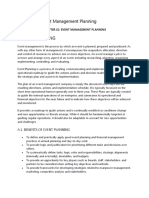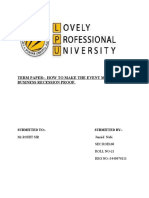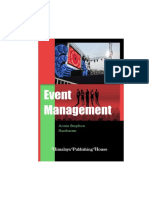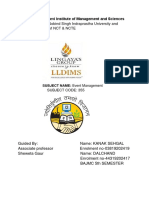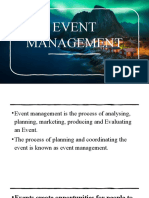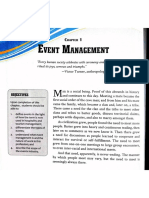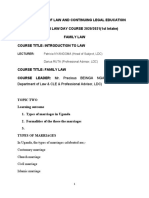PAMANTASAN NG LUNGSOD NG MAYNILA
PLM Business School
Department of Hospitality Management ITM 3109-1 INTRODUCTION TO MEETINGS, INCENTIVES, CONFERENCES AND EVENTS MANAGEMENT (LECTURE)
Module 1: EVENT MANAGEMENT
MODULE OBJECTIVES This chapter will help students:
1. Define events in light of how the term is now used in hospitality and tourism management.
2. Differentiate the types of events.
3. Understand what event management is and the nature of work in this profession.
4. Describe the scope of the events industry.
INTRODUCTION Man is a social being. Proof of this abounds in history and continues to this day. Meeting a mate became the first social order of
the caveman; and from him and his mate came the family, which became clans and, later, tribes. There came a need for clans and
tribes to meet other clans and tribes to barter goods, discuss territorial claims, perhaps settle disputes, and also marry amongst
them.
As civilization grew, people found the need to meet more people. Barter grew into heavy and continuous trading, then later to
commerce the way we now know it. There grew a need to get to know more people, and a need for more discussions, as people
learned to cooperate and interact for survival or self-fulfillment. The need to meet grew from one-on-one meetings to large
groups, to even inter-racial international meets.
And that need is apparently never-ending. How people meet may vary, but the need to meet will seemingly always be there.
Man has been partying and meeting since bygone eras, but it is in the 1980s that such gatherings became the subject of many
studies. Textbooks written for the hospitality industry initially included topics on banquets and catering, but these focused on the
operations of such activities. Books on tourism management talked about transportation arrangements and tours. But because
parties and meetings have grown in scope and magnitude, a new field emerged—event management.
I. Events and Event Management An event is commonly understood as an occurrence; something that happens. In the 1980s the buzzword was “special events.” Joe
Goldblatt, an authority on event management and author of several books on the subject defined special events as “a unique
moment in time celebrated with ceremony and ritual to satisfy specific needs”.
1
� Donald Getz, a professor of tourism and hospitality management from the University of Calgary presents his definition of special
events from two perspectives:
"A special event is a one-time or infrequently occurring event outside normal programs or activities of the sponsoring or
organizing body;" or
"To the customer or guest, a special event is an opportunity for a leisure, social or cultural experience outside the normal
range of choices or beyond everyday experience."
Getz (2002) later narrowed the definition to planned events, or events produced for a purpose.
These definitions separate special events or events, as will be mentioned here henceforth, from any other occurrences in our day-
to-day lives, as well as any unplanned, spontaneous, or spur-of-the-moment activity. Events are planned and are always planned to
be special. Events have these common characteristics:
Are unique occurrences that do not happen very often
Have a limited duration (happening within hours or days at the most)
Happen with a live audience in attendance
Require one or more groups to plan and organize
Are staged for a purpose
In sum, events are unique happenings that bring people together for a purpose.
With the rise of events, came the new field now known as event management. The International Dictionary of Event Management
(Goldblatt, 2001) defines event management as:
1. A function requiring public assembly for the purpose of celebration, education, marketing, and reunion; and
2. The process that includes research, design, planning, coordination, and evaluation of events.
With the purpose and the process of event management in mind, this rising field is deemed as a science and an art. It is a venue to
incorporate principles in the field of management and business with the social graces, protocol, and the art of creating unique
experiences.
II. Types of Events A. Events can be classified according to the purpose of the gathering, the number of people involved, frequency, and the
magnitude of the impact.
A.1. According to purpose: The C's of events
A.1.1. Celebrate Celebrate
2
�Events bring people together to celebrate life's milestones and accomplishments and to perform rituals or ceremonies as required Life-cycle events
by religion, culture, or society. Such occasions include life-cycle events (birthdays, debut, weddings, wedding anniversaries, Religious rituals
retirement), religious rituals (baptism, marriage, funerals), commemorative ceremonies (graduation, job promotion, awards), and Commemorative
socio-civic activities (founding anniversaries, civic events, feasts, and festivals). ceremonies
Socio-civic events
A.1.2. Commune
Events bring people together to commune and strengthen bonds of friendship and restore relationships. Class reunions and family
reunions are events that create new memories as people relive memories of days past. The Olympics and similar international Commune
sporting events have become hallmark events that bring people and cultures together. Reunions
Hallmark events
A.1.3. Convene
Events bring people together to convene, that is to share and pass on knowledge among peers and colleagues. Meetings,
conferences, conventions, and similar gatherings aim to be a venue to educate or impart new learning to the participants.
Convene
A.1.4. Commerce Meetings, conferences,
And events bring people together for commerce to market and promote product offerings. Companies have recognized event conventions
marketing as a very potent marketing tool, particularly in what is now viewed as the experience economy (Gilmore, 2003, Autumn).
Product launches, exhibits, trade shows, product demonstrations, and retail events are just some of the activities that marketers
use to allow prospects to experience their product, thus bringing the product closer to the hearts of their target market.
A.2. According to the number of participants
Few
Many
Multitude
Events may be classified according to the number of participants expected. This may range from limited board meetings to wide-
scale conventions with thousands of delegates. Life-cycle events may range from intimate family gatherings to receptions that
include the whole townsfolk. Attendance to exhibits and marketing events may be limited to a few hundred trade visitors or the
general public. There are also festivals and hallmark events that attract the interest of a huge number of people, running even up
to the millions.
A.3. According to the frequency
Monthly
3
� Quarterly
Semestral
Annual
Biennial
Events may range from a once-ever event to monthly, quarterly, semestral, annual, biennial, triennial, or quadrennial events. There
are also events held on a “need to” basis.
A.4. According to the magnitude of impact
It is common for events to leave an imprint in the minds of the people who attend the event. There are also events that have long-
lasting and far-reaching effects. Every now and then, there are events that impact a large number of people who may have
attended or witnessed the event, not only for the present but also for the future. Such are hallmark events like the Olympics.
B. Events can be classified into four broad categories based on their purpose and objective:
B.1. Leisure events e.g., leisure sport, music, recreation.
B.2. Cultural events e.g., ceremonial, religious, art, heritage, and folklore.
B.3. Personal events e.g., weddings, birthdays, anniversaries.
B.4. Organizational events e.g., commercial, political, charitable, sales, product launch, expo.
C. To better understand terms used in the business, we refer to The International Dictionary of Event Management for definitions
(Goldblatt, 2001).
Meeting – an assembly of individuals gathered to discuss items of material interest or engage in professional development thru
learning activities.
Conference
1. A participatory meeting is defined as the discussion of subjects related to a specific topic or area. May include fact-finding,
problem-solving, and consultation.
2. An event used by any organization to meet and exchange views, convey a message, open a debate, or give publicity to
some area of opinion on a specific issue. No tradition, continuity, or specific period is required to convene a conference.
4
� Although not generally limited in time, conferences are usually of short duration with specific objectives. Conferences are
generally smaller in scale than congresses or conventions.
3. An assembly of a large number of individuals to discuss items of mutual interest or engage in professional development
through learning.
Congress
1. A scheduled, periodic meeting of delegates or representatives of interested groups to discuss a subject.
2. The European term for the convention.
Convention – A general and formal meeting of a legislative body or social or economic group to provide information on a particular
situation, and to establish consent on policies among participants. Usually of limited duration and set objectives, but no
determined frequency.
Foreign Meeting – a meeting comprised of attendees from other nations; also known as an international meeting or institute.
Seminar – a lecture, presentation, and discussion under the guidance of an expert discussion leader allowing participants to share
experiences in a particular field.
Workshop
1. A training session in which participants develop skills and knowledge in a given field.
2. An event designed to stimulate intensive discussion and compensate for diverging views in a particular discipline or
subject.
3. An informal public session of free discussion is organized to take place between formal plenary sessions on a subject
chosen by the participants or on a special problem suggested by the organizers.
Exhibit – although the terms exhibit, booth, and stand are often used interchangeably, an exhibit is actually all of the display
materials and products housed in a booth or stand.
Exhibition – a display for public view of products or promotional materials for the purpose of PR, sales, and/or marketing; also
known as exposition, industrial show, or trade show.
Fair – a public celebration that includes commercial and civic activities.
Festival – A public celebration that conveys, thru a kaleidoscope of activities, certain meanings to participants and spectators.
5
� Parade – A moving pageant including floats, bands, individual entertainers, and dignitaries.
Event Marketing – The process that integrates a range of marketing elements and a central event sponsorship or lifestyle-themed
activity. This process incorporates advertising, employee and consumer programs, sales promotion, PR, causes business to
business, TV property, and trade promotion with a specific event.
III. Fields of Specialization Event management has evolved to become the profession that plans and creates occurrences that purposely bring people
together. The degree of preparations for such activities has grown in depth and expanse, such that sub-fields of specialization
have emerged. Goldblatt (2002) lists some of these sub-fields:
civic events
expositions
hallmark events
incentive travel
retail events
social life-cycle events tourism
tourism
conventions
fairs and festivals
hospitality
Meetings and conferences
Reunions
sports events
Many event companies have chosen to focus on one sub-field alone, thus being able to specialize to serve the needs of their clients
better.
IV. The Events Industry In the Philippines, event management is still a young, but rapidly rising industry. Most event management companies trace their
roots in the advertising and PR industries, the hospitality business, tourism, exhibits and expositions, and marketing. Many event
managers/planners/coordinators learned to manage events as part of their job, i.e., "one of the duties that may be assigned from
time to time," learning from the hits and misses that they make. Many of those who focus on weddings and birthdays learned the
business by planning their own events first, gaining much experience from that trial, they gain confidence to pursue event
management as a profession. Event companies range from weekend entrepreneurs who do events as a hobby or sideline to well-
manned, professionalized organizations, and so-called "eventologists." Many do not have formal scholastic training in event
management even if they have a college degree (Lopez de Leon, 2006). Most learned the craft mainly through trial and error and
self-study. These days, degree programs in event management are available in the United States, United Kingdom, Australia, and
New Zealand; even Hong Kong and Korea are already developing events as a specialist field (Getz, 2002). Within the past five years,
formal schooling in professional event management has become available locally. Some colleges have included courses in event
6
� management in the curriculum of hospitality, tourism, management, and courses, and as a post-baccalaureate diploma course for
professionals.
Local event managers draw support from various suppliers who help execute awesome events. There are a lot of suppliers in every
major city who can provide anything from audio-visual equipment, technical staging expertise, promotional giveaways, flowers,
and food, to professional speakers, and even professional bouncers. The requirements of the industry have also given rise to new
professions such as event stylist, calligrapher, professional balloon artist, and mascot director.
The growing events industry also necessitated the need for some other industries to take stock of their capabilities and expand
their line of services to meet the demands of their clients. Hotels and caterers have included event management in the training of
their personnel and have broadened their scope of work so as to ably assist clients from planning to staging their events. Some
hotels have renamed their banquet department, events department, or event management. Quick-service restaurants are now
looking at institutional and corporate events as an additional revenue stream. Travel agents have repositioned themselves as travel
concierges—planning the client's every step and attending to every need he/she might have.
The local events industry still has a long way to go in terms of development. More mature industries like those in the United States
and the United Kingdom already have professional certification for event professionals in various fields of specialization. They, too,
have sought assistance from peers through industry associations, and other support groups. They have addressed concerns on
insurance, risk management, and in staging green, sustainable events.
With better informed and better-trained event professionals, the Philippines is well on its way to making great events happen.
REFERENCES 1. Eloisa Altez-Romero. EVENTS MANAGEMENT (OBE ALIGNED). Rex Book Store, 2019.
2. Zenaida Lansangan-Cruz. INTRO. TO MEETINGS, INCENTIVES, CONFERENCES AND EVENTS MANAGEMENT, Rex Book
Store. 2020.
3. Germaine Angelica Salvador. EVENT MANAGEMENT – ENVISION. EXECUTE. EVALUATE. C and E Publishing, Inc. 2019.
4. Philippine M.I.C.E. Academy, PROFESSIONAL EVENT MANAGEMENT: A GUIDE TO MEETINGS, INCENTIVES,
CONVENTIONS, EXHIBITIONS AND EVENTS, C & E Publishing, Inc., 2019.
5. C. A. Preston, Leonard H. Hoyle, EVENT MARKETING: HOW TO SUCCESSFULLY PROMOTE EVENTS, FESTIVALS,
CONVENTIONS, AND EXPOSITIONS, John Wiley & Sons, 2012
